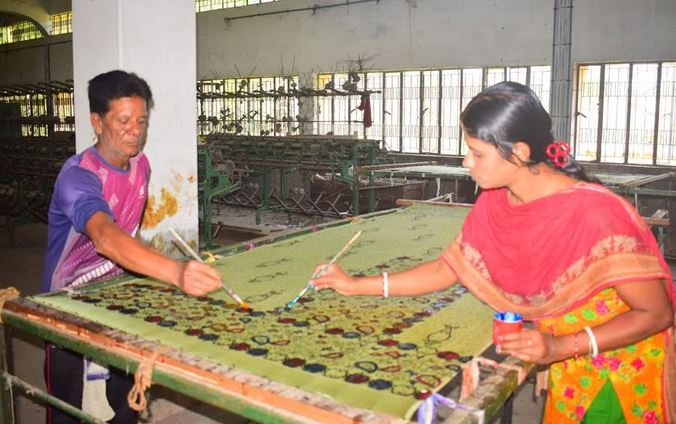News Flash

By Md Aynal Haque
RAJSHAHI, March 13, 2025 (BSS) - Manufacturing and marketing of silk clothes become vibrant on the eve of holy Eid-ul-Fitr, one of the largest religious festivals for the Muslims, as the clothing showrooms are seen bustling with the silk buyers in the region famous for quality silk production.
With the eye-catching colour and design of the silk attires, a large number of people especially the adolescents are humming towards the showrooms to collect their best choice.
As a result, employees of the silk factories are passing their busiest times both on days and at nights. Silk factories in the BSCIC and the government silk factory are also operating round the clock.
Samrat Ali, an artisan of Rajshahi silk, said that the work pressure was also high because of the relatively high sales in the showrooms this time.
But saree, three-piece and punjabi works have to be done more. Besides, other contents are also being made.
Geetha Rani and Moushumi Biswas, artisans of Amana Silk, said that sale has increased because Eid and Bengali New Year are coming together.
"Due to these festivals, we are designing different types of clothes including sarees, three-pieces and punjabis. We eight people are working 7/24 in three shifts due to the high workload," said Geetha.
Silk showrooms are decked up in clothes. As Eid is approaching, customers have started crowding these showrooms. Buyers are also buying silk sarees, punjabis, three-pieces and other products of ever-new designs and rich colours.
Sharmin Akhtar Sapna, a private university teacher came to buy Eid clothes at Amena Silk showroom.
She said, "I always like silk sarees. I have come to buy a saree again. There is more innovation in sarees this time. Different designs have also arrived in the showrooms. But the price is high."
Silk fabrics, woven and designed by local artisans, are in huge demand in the Eid markets of the city, with the affluent people rushing to the silk showrooms every day.
Saidur Rahman, showroom in-charge of Sapura Silk, said katoar saree of muslin is on the top of buyers' choice, selling from Tk 4,200 to Tk 1, 80,000.
He said silk-made sarees, punjabees, three-pieces and children's dresses were assembled at the showrooms.
Usha Silk has also brought a new design with stripe which is being sold at Tk 1,500 to Tk 9,500 per piece, sellers said.
Because of high demand for silk, factories in the BSCIC industrial estate are seen operating round the clock as the labourers are passing their sleepless nights to fulfil the market demand.
Nur Alam Bulbul, showroom in-charge of Usha Silk, said their sharies are being sold at Tk 2,500 to Tk 60,500 and the three-pieces priced at Tk 3,500 to Tk 85,500.
He said silk clothes business could be expected at around Tk 35-40 crore during the current Eid season.
Varieties of silk clothes namely Bolakakar Chupi, Sui-Sutakatan, Kotisilk, Joyashri, Silk Katan, Water Katan, Jamdani Katan, Borkatan, Dupiana, Jhornakatan, shari, three piece, orna, panjabi-pajama, shirt, fatua and scarf are on display in every shop and showroom to attract the buyers.
The well-off buyers are purchasing their best choice whatever its price is while the middle and low-income groups are seen bargaining with the sellers.
Silk manufacturers including Sapura Silk, Usha Silk, Rajshahi Silk Fashion, Amena Silk and Mohananda Silk are doing their brisk business on the Eid, bringing new designs and colours of clothes made by silk.
Meanwhile, Bangladesh Silk Development Board (BSDB) has been working to revive the lost glory of the traditional silk sector after the best uses of existing natural resources in the region, including its vast Barind tract.
Since the immemorial time, Rajshahi has been famous for silk but its legacy was on the verge of waning for the last couple of decades due to various reasons.
Once upon a time, most of the villagers were seen farming silkworm sericulture side by side with their regular household activities in Bagha and Charghat upazilas in Rajshahi and Bholahat upazila in Chapainawabganj districts.
There are enormous scopes of generating employment opportunities along with improving living and livelihood conditions of the marginalized and landless people, particularly women, through engaging them in sericulture.
"We intended to boost the capacity of the targeted people through imparting them with training in different stages of sericulture," said Abdul Mannan, Director General (DG) of BSDB, while talking to BSS at his office here recently.